外研版必修4 Module 6 Unexplained Mysteries of the Nature World Gramma情态动词r课件(共30张PPT)
文档属性
| 名称 | 外研版必修4 Module 6 Unexplained Mysteries of the Nature World Gramma情态动词r课件(共30张PPT) |  | |
| 格式 | zip | ||
| 文件大小 | 2.6MB | ||
| 资源类型 | 教案 | ||
| 版本资源 | 外研版 | ||
| 科目 | 英语 | ||
| 更新时间 | 2018-12-03 08:20:06 | ||
图片预览


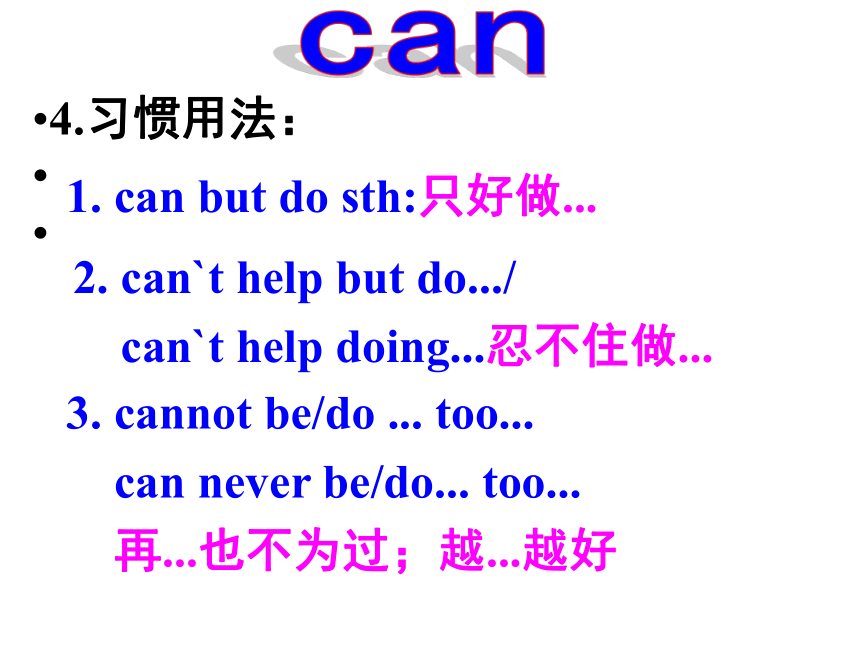

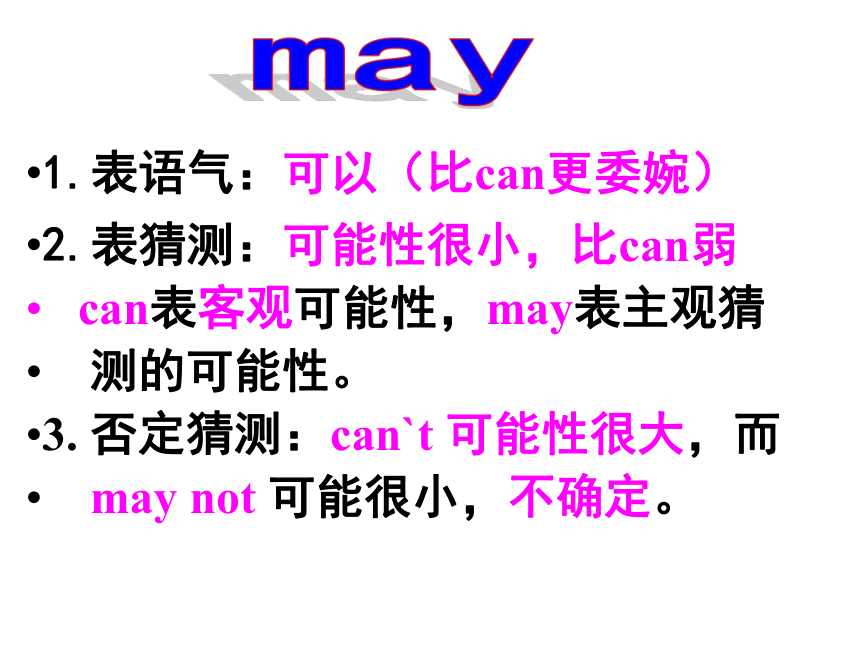
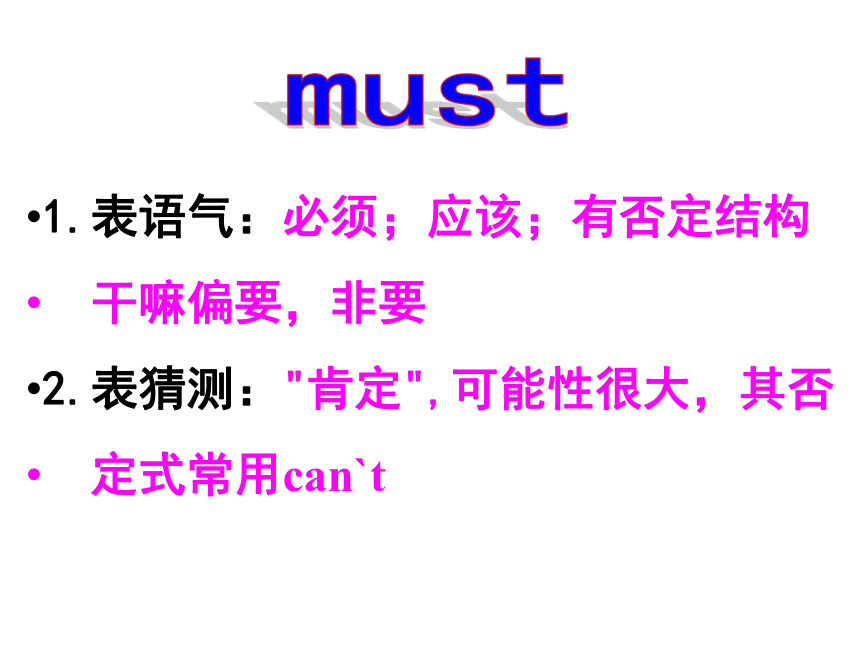
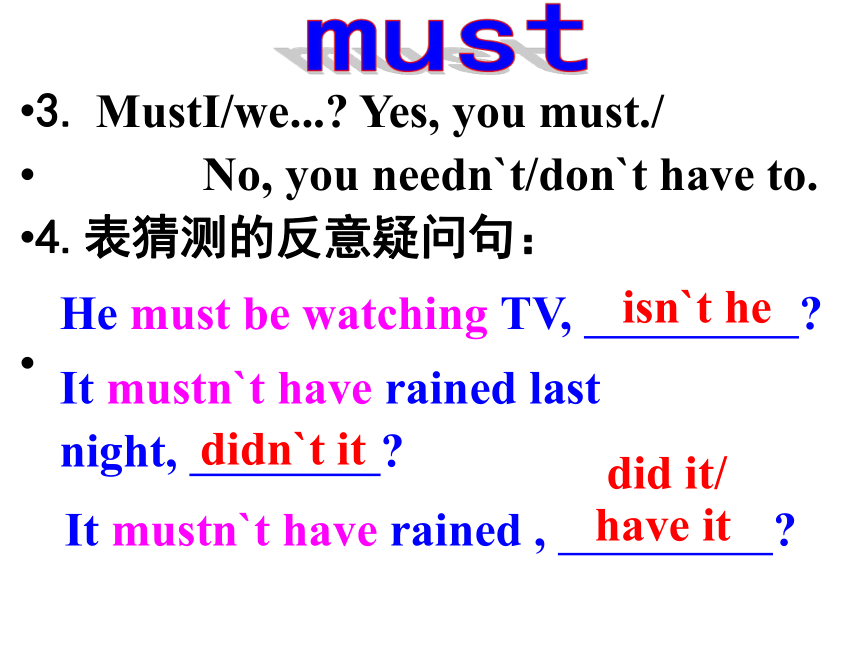
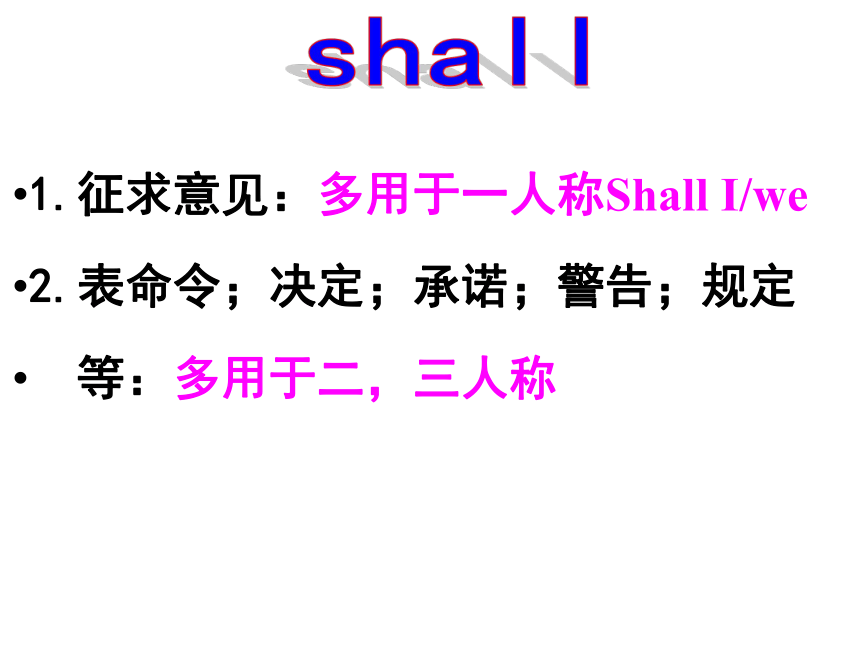


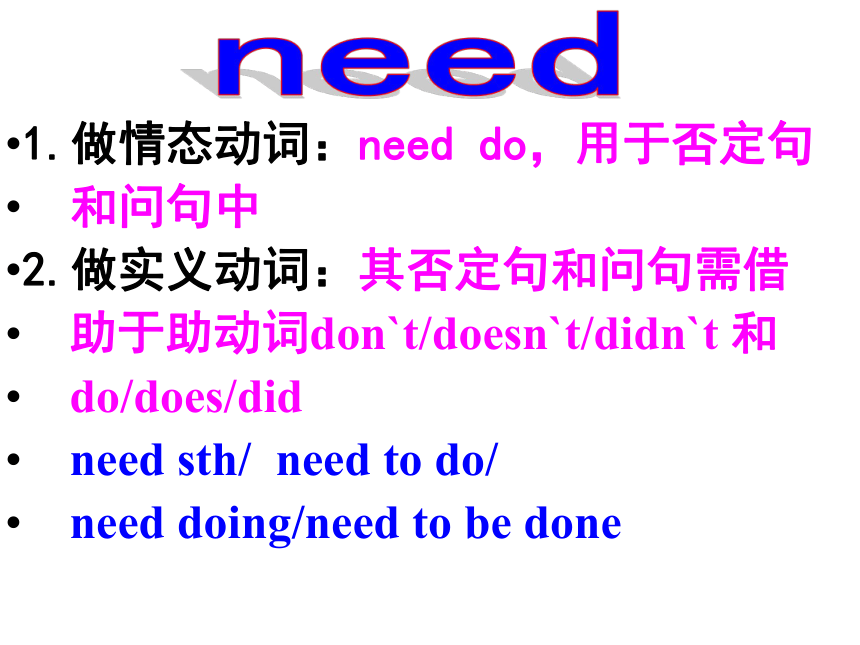

文档简介
课件30张PPT。Grammar
情态动词1.表能力:能够;会
2.表猜测:可能(客观的可能性)
3.表语气 :可以can4.习惯用法:
1. can but do sth:只好做... 2. can`t help but do.../
can`t help doing...忍不住做...3. cannot be/do ... too...
can never be/do... too...
再...也不为过;越...越好 can1.表过去的能力:能够;会
2.表猜测:可能性比can弱。
3.表语气 :可以(委婉请求或建议)Could I do... /Could you(please) do...?
4.表示虚拟语气:
could1.表语气:可以(比can更委婉)
2.表猜测:可能性很小,比can弱
can表客观可能性,may表主观猜
测的可能性。
3. 否定猜测:can`t 可能性很大,而
may not 可能很小,不确定。 may1.表语气:必须;应该;有否定结构
干嘛偏要,非要
2.表猜测:"肯定",可能性很大,其否
定式常用can`t must3. MustI/we...? Yes, you must./
No, you needn`t/don`t have to.
4.表猜测的反意疑问句:
mustHe must be watching TV, ? isn`t he It mustn`t have rained last night, ? didn`t it It mustn`t have rained , ? did it/
have it 1.征求意见:多用于一人称Shall I/we
2.表命令;决定;承诺;警告;规定
等:多用于二,三人称
shall1. 义务;责任等:应该;应当
2. 推测:照理说;按说应该
3. 表责备:本应该做...而未做...
should/ought to have done/
本不应该做...而做了...
should not /ought not to have done
4.表惊奇;遗憾:竟然;居然
should/ought to1. 表意愿;决心:愿;会
2. 表请求:
Will you/Would you (please)do...?
3. 倾向性,必然性;习惯性:
will/would1.做情态动词:need do,用于否定句
和问句中
2.做实义动词:其否定句和问句需借
助于助动词don`t/doesn`t/didn`t 和
do/does/did
need sth/ need to do/
need doing/need to be done
need1.做情态动词:dare do,用于否定句,
问句和条件状语从句中,没有人称
变化。
2.做实义动词:dare to do,有人称变化,
其否定句和问句需借助于助动词
don`t/doesn`t/didn`t 和 do/does/did,
否定句中的to可以省略。 dare1.过去常常:过去的习惯,现在已不
再进行或发生。
2.否定句和疑问句有两种变化形式:
直接把used当助动词,或借助动词。
3. 与would的区别:would只强调过去
的习惯,与现在不形成对比。 used to1.强调客观必须:不得不
2.否定句和疑问句有两种变化形式:
要借助动词。
3. 有人称时态变化:have/has/had to。 have to1.强调通过后天努力而具备的能力
2.有人称,时态变化 be able to1. must do/be :肯定是/做...
must be doing:肯定在做...
must have done:肯定已做... 情态动词表推测的用法 P190情态动词表推测的用法 P1902. can do/be:可能是/做...(客观可能性)
can`t be/do :不可能是/做...
can`t be doing:不可能在做...
can`t have done:(过去)不可能做...
could have done:(过去)可能做了...3. may(not) do/be:也许(不)是/做...
may be doing:也许在做...
may have done:也许已做... 情态动词表推测的用法 P190Page 54 .1. Perhaps there are still dinosaurs somewhere. (might)There might still be dinosaurs somewhere.2. Don’t go near the water. Perhaps it’s
very deep. (may)Don’t go near the water. It may be very deep.3. We probably won’t see the monster. (unlikely)We are unlikely to see the monster.4. Perhaps there is an underground
river from Loch Ness to the sea. There may be an underground river from Loch Ness to the sea.5. We must help him – perhaps he can’t swim! (may)We must help him – he may not be able to swim.6. There are probably lots of strange
creatures in that lake. (likely)There are likely to be lots of strange creatures in that lake.Explanations given for the disappearance of the dinosaurs? A meteorite hit the earth.
They stopped evolving.
They killed each other.
A volcanic eruption.
Cancer caused by radiation.推测过去已经发生的事情The meteorite may have hit the earth.
The dinosaurs may have stopped evolving.
They might have killed each other.
It might have been volcanic eruptions.The meteorite may have caused (cause) a huge dust cloud.
The dust cloud may have cut off (cut off) the sunlight.
Small animals may have survived (survive) by eating nuts and seeds.Page 57 .1. might have caused2. may have cut off3. may have survived4. might have been killedRewrite the sentences with the words in the brackets.Page 97 .1. The monster of lake Tianchi
may be a distant cousin of Nessie.2. You are unlikely to see the
monster if you only stay a week.3. There might be unknown
creatures living in the oceans
and deep lakes.Rewrite the sentences with the words in the brackets.4. The Sasquatch may be a monkey
which escaped from a zoo.5.Tasmanian tiger might not be
extinct. 6. There are unlikely any species of
dinosaurs alive today.7. There likely other living creatures
in the universe.Page 98 .1. might have invented2. may have been3.may have swam4.might have seen5. might have existed6.may have killedFinish the exercises in the workbooks.Homework
情态动词1.表能力:能够;会
2.表猜测:可能(客观的可能性)
3.表语气 :可以can4.习惯用法:
1. can but do sth:只好做... 2. can`t help but do.../
can`t help doing...忍不住做...3. cannot be/do ... too...
can never be/do... too...
再...也不为过;越...越好 can1.表过去的能力:能够;会
2.表猜测:可能性比can弱。
3.表语气 :可以(委婉请求或建议)Could I do... /Could you(please) do...?
4.表示虚拟语气:
could1.表语气:可以(比can更委婉)
2.表猜测:可能性很小,比can弱
can表客观可能性,may表主观猜
测的可能性。
3. 否定猜测:can`t 可能性很大,而
may not 可能很小,不确定。 may1.表语气:必须;应该;有否定结构
干嘛偏要,非要
2.表猜测:"肯定",可能性很大,其否
定式常用can`t must3. MustI/we...? Yes, you must./
No, you needn`t/don`t have to.
4.表猜测的反意疑问句:
mustHe must be watching TV, ? isn`t he It mustn`t have rained last night, ? didn`t it It mustn`t have rained , ? did it/
have it 1.征求意见:多用于一人称Shall I/we
2.表命令;决定;承诺;警告;规定
等:多用于二,三人称
shall1. 义务;责任等:应该;应当
2. 推测:照理说;按说应该
3. 表责备:本应该做...而未做...
should/ought to have done/
本不应该做...而做了...
should not /ought not to have done
4.表惊奇;遗憾:竟然;居然
should/ought to1. 表意愿;决心:愿;会
2. 表请求:
Will you/Would you (please)do...?
3. 倾向性,必然性;习惯性:
will/would1.做情态动词:need do,用于否定句
和问句中
2.做实义动词:其否定句和问句需借
助于助动词don`t/doesn`t/didn`t 和
do/does/did
need sth/ need to do/
need doing/need to be done
need1.做情态动词:dare do,用于否定句,
问句和条件状语从句中,没有人称
变化。
2.做实义动词:dare to do,有人称变化,
其否定句和问句需借助于助动词
don`t/doesn`t/didn`t 和 do/does/did,
否定句中的to可以省略。 dare1.过去常常:过去的习惯,现在已不
再进行或发生。
2.否定句和疑问句有两种变化形式:
直接把used当助动词,或借助动词。
3. 与would的区别:would只强调过去
的习惯,与现在不形成对比。 used to1.强调客观必须:不得不
2.否定句和疑问句有两种变化形式:
要借助动词。
3. 有人称时态变化:have/has/had to。 have to1.强调通过后天努力而具备的能力
2.有人称,时态变化 be able to1. must do/be :肯定是/做...
must be doing:肯定在做...
must have done:肯定已做... 情态动词表推测的用法 P190情态动词表推测的用法 P1902. can do/be:可能是/做...(客观可能性)
can`t be/do :不可能是/做...
can`t be doing:不可能在做...
can`t have done:(过去)不可能做...
could have done:(过去)可能做了...3. may(not) do/be:也许(不)是/做...
may be doing:也许在做...
may have done:也许已做... 情态动词表推测的用法 P190Page 54 .1. Perhaps there are still dinosaurs somewhere. (might)There might still be dinosaurs somewhere.2. Don’t go near the water. Perhaps it’s
very deep. (may)Don’t go near the water. It may be very deep.3. We probably won’t see the monster. (unlikely)We are unlikely to see the monster.4. Perhaps there is an underground
river from Loch Ness to the sea. There may be an underground river from Loch Ness to the sea.5. We must help him – perhaps he can’t swim! (may)We must help him – he may not be able to swim.6. There are probably lots of strange
creatures in that lake. (likely)There are likely to be lots of strange creatures in that lake.Explanations given for the disappearance of the dinosaurs? A meteorite hit the earth.
They stopped evolving.
They killed each other.
A volcanic eruption.
Cancer caused by radiation.推测过去已经发生的事情The meteorite may have hit the earth.
The dinosaurs may have stopped evolving.
They might have killed each other.
It might have been volcanic eruptions.The meteorite may have caused (cause) a huge dust cloud.
The dust cloud may have cut off (cut off) the sunlight.
Small animals may have survived (survive) by eating nuts and seeds.Page 57 .1. might have caused2. may have cut off3. may have survived4. might have been killedRewrite the sentences with the words in the brackets.Page 97 .1. The monster of lake Tianchi
may be a distant cousin of Nessie.2. You are unlikely to see the
monster if you only stay a week.3. There might be unknown
creatures living in the oceans
and deep lakes.Rewrite the sentences with the words in the brackets.4. The Sasquatch may be a monkey
which escaped from a zoo.5.Tasmanian tiger might not be
extinct. 6. There are unlikely any species of
dinosaurs alive today.7. There likely other living creatures
in the universe.Page 98 .1. might have invented2. may have been3.may have swam4.might have seen5. might have existed6.may have killedFinish the exercises in the workbooks.Homework
